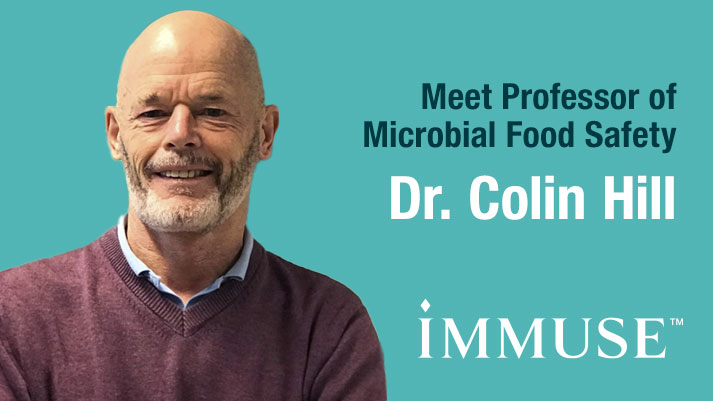Meet the Experts at IMMUSE™: Professor Dr. Colin Hill
Kyowa Hakko’s Scientific Advisor on the Exciting World of Postbiotics

Dedicated to improving lives through health sciences, Kyowa Hakko is passionate about consumer education — partnering with world class experts to disseminate complex scientific information.
Professor Dr. Colin Hill is a leading scientists and thought leader in the field of gut-microbiome research, and the latest addition to the IMMUSE™ Scientific Advisory Board. As a part of IMMUSE’s team of experts, Dr. Hill will help further advance the understanding and education of postbiotics by participating in group discussions, as well as providing scientific group evaluation and feedback.
An expert in microbiome science and its clinical applications, Dr. Hills is known for his impressive background in mining the microbiome for novel therapies and has been a member of ISAPP’s (International Scientific Association for Probiotics and Prebiotics) board of directors since 2009;and served as President of ISAPP from 2012 to 2015.
Among his many notable accomplishments, including authoring the landmark ISAPP consensus paper on probiotics, Dr. Hill helped establish the definition of a postbiotic put forth by the international scientific association. He is also a Professor of Microbial Food Safety in the School of Microbiology at University College Cork, Ireland and was elected to the American Academy of Microbiology in 2010.
What are Postbiotics?
According to the ISAPP, postbiotics are preparations of inanimate microorganisms and/or their components that confers a health benefit on the host.
Below Dr. Hill answers our questions as we explore the exciting new world of postbiotics and how our gut microbiome impacts our immune health.
IMMUSE: As a research scientist, why did you become invested in mining the microbiome for novel therapies?
That started almost twenty years ago when it was beginning to emerge how important a role the gut microbiome plays in human health. So we reasoned that if the microbiome plays an important role it must be producing certain molecules or structures that interacts with and benefits the host. The most likely source of these molecules or structures are the trillions of microbes in the human gut and so we decide to ‘mine’ the microbiome to see if we could identify beneficial microbes and match them with specific health benefits.
IMMUSE: What is the connection between the gut microbiome and immune health?
The microbiome is in constant close contact with us, interacting at many levels with both the innate and adaptive immune systems. Since our immune system evolved in a microbial world it is normal for it to encounter microbes and for a two-way communication to result.
For many years now scientists have worried about the rise in auto-immune diseases, and have noted how this has coincided with a reduction in the number of microbes we encounter every day. Probiotics and postbiotics may be one tool that we can use to educate our immune systems and prevent disease.
IMMUSE: What makes postbiotics so exciting?
For me, one of the most exciting things about postbiotics is that they open up an enormous range of microbes as potential therapeutics. Many of the microbes in the gut are very difficult to grow outside of that environment, and even more difficult to keep in an active state in a product that can be given to a consumer. However, if we can inactivate the microbes then this inanimate form becomes much more stable. We don’t have to worry about the microbes dying off over time since they have already been inactivated.
IMMUSE: What are the advantages of postbiotics over probiotics?
Once again, the fact that the postbiotics are inanimate is one of their major advantages over probiotics. While probiotics have a very good safety record they could potentially cause infections in vulnerable consumers, but this is not possible with postbiotics. Also, the dose can be very carefully controlled for postbiotics since they cannot multiply in the host. Lastly, they are likely to be very stable and could have long shelf lives, even at ambient temperatures.
IMMUSE: What peaked your interest in working with IMMUSE™ (LC-Plasma)?
I am always interested in working with companies that put science first, and want to understand the mechanism through which their products influence human and animal health. It is important that we work together to advance this field in a way that can give the consumer confidence that the products they buy have been rigorously tested.
IMMUSE: Anything else our readers should know about postbiotics, immune health and the microbiome?
We should always remember that we have as many microbial cells as human cells and that we are really superorganisms, composed of both human and microbial components. When you think of it like that it makes sense that we also have to look after our microbial selves, and make sure that we maintain a balance between our microbes and our immune systems.
Click the button below to learn more about the differences between probiotics and postbiotics.
